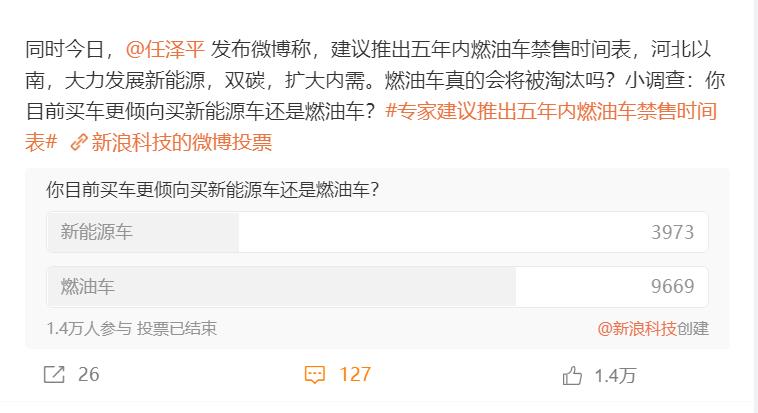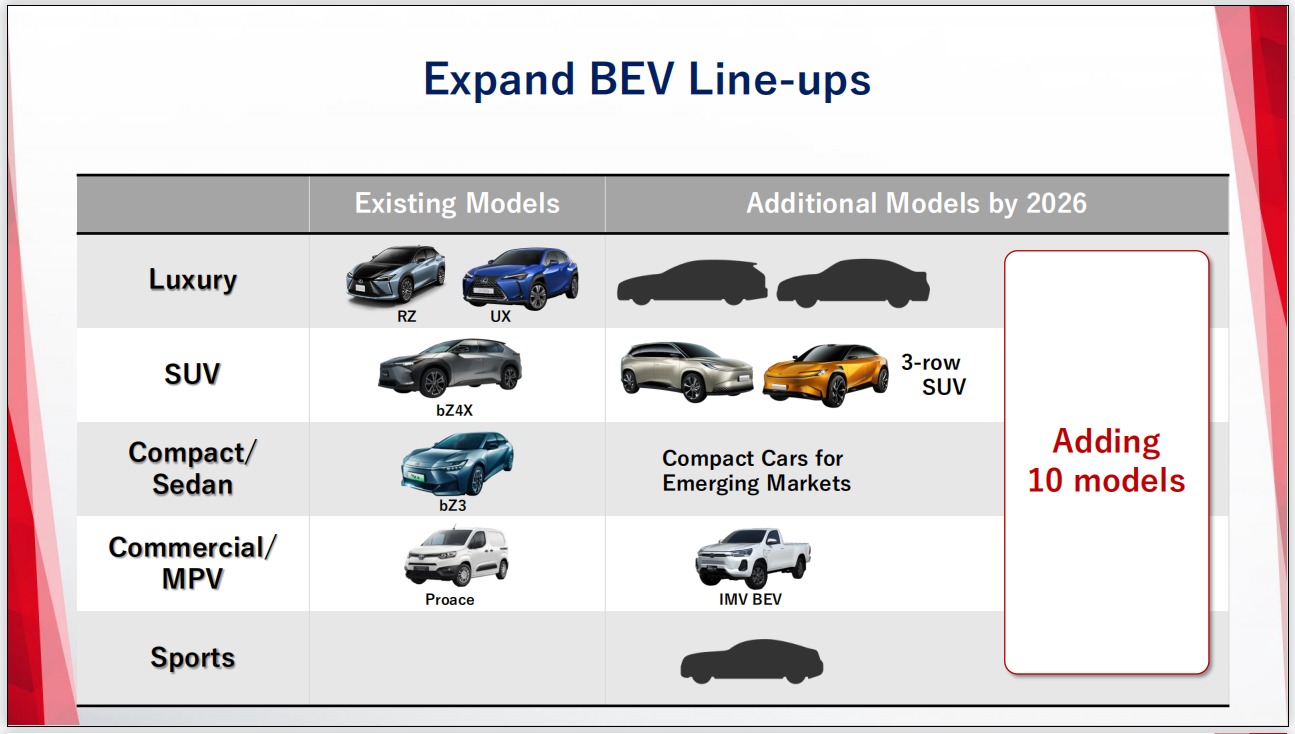"Don’t give up fuel vehicles too early"! Toyota’s chief scientist called for a longer time for hybrid cars, and netizens ridiculed: Why wait for you?
On May 23, the topic of "Toyota once again calls on not to give up fuel vehicles prematurely" hit the hot search and triggered heated discussions.
The issue drew attention after Gill Pratt, Toyota’s chief scientist and chief executive of Toyota Research Institute, said a rapid transition to pure electric vehicles could lead some owners to continue using older gasoline vehicles, calling for hybrids to be given longer periods of time.
In his opinion, subsidies for pure electric routes and restrictions on other routes may make some consumers choose electric vehicles, but for other car owners, it may have the opposite effect.
"If you think about the time horizon around 2050, it is entirely conceivable that EVs [i.e. pure electric vehicles] will be at the heart. However, by’conceivable ‘we mean that there is no certainty that’this will be the case’ at this time. Therefore, we are constantly developing and exploring other options, and we cannot yet determine with certainty whether [it will] be the right answer." Pratt believes that the transition to electric vehicles will take longer than expected, and that a multi-pronged approach to hybrid and alternative fuels will be better for the environment and the automotive industry. Battery materials and renewable charging infrastructure will eventually be abundant, but battery materials, mines, renewable generation facilities, transmission lines and seasonal energy storage facilities will take decades to scale up.
In this regard, some netizens believe that "Toyota is crying out, mainly because the Japanese cars represented by Toyota are lagging behind in this round of technological waves, and they need more time to make up for and catch up. Otherwise, they will die or become a niche brand." Some netizens joked, "Why should I give you time to wait for you?"


Image source: Sina Weibo
However, Mr. Pratt notes that many believe Japanese companies are lagging behind in EVs, but that is not the problem. "Even though the auto industry has been mature for decades, there are still a lot of auto companies, and there is no momentum to dominate the entire market. The auto industry does not have the soil for the top players to have an overwhelming advantage. On the contrary, sometimes even doing the same thing later can create something better," Mr. Pratt says.
In fact, discussions about whether fuel vehicles should be withdrawn are not uncommon. As recently as May 15, the economist Ren Zeping (@Ren Zeping) posted on social media, "It is recommended to introduce a five-year ban on the sale of fuel vehicles. South of Hebei, vigorously develop new energy, double carbon, and expand domestic demand."
In the "Do you currently prefer to buy a new energy vehicle or a fuel vehicle?" poll initiated by the media on the same day, about 14,000 people participated in the vote, and nearly 70% of netizens chose "fuel vehicles".

Image source: Sina Weibo
"Let’s talk about this issue when the mileage anxiety of new energy vehicles is solved," some netizens said. "Without the simultaneous advancement of infrastructure, don’t talk about banned fuel vehicles." Others said, "The low temperature of fuel vehicles will not affect, and it is very safe to go at high speed. I am not worried about the battery catching fire." However, some netizens believe that "new energy is a trend, and no one can stop it."
Despite the controversy among netizens, under the global "carbon neutrality" consensus, many countries and regions have introduced a ban on combustion schedules. For example, on March 28 this year, the European Union Council approved a regulation to ban the sale of new fuel-powered cars and minivans that cause carbon emissions from 2035. However, under German requirements, new fuel vehicles using carbon-neutral fuels are expected to continue to be sold after 2035.
The European Union Council said in a statement on the same day that according to the regulation, from 2030 to 2034, the carbon dioxide emissions of new fuel cars and minivans will be reduced by 55% and 50% respectively compared with 2021, and will be reduced to zero by 2035. The European Union Commission originally wanted to ban the sale of all new fuel vehicles, but Germany, a major manufacturer of fuel vehicles, proposed to continue selling new fuel vehicles using carbon-neutral fuels after 2035. Finally, the European Union Commission and Germany announced an agreement, clearing the legislative hurdle.
In China, Hainan Province is at the forefront of banning the sale of fuel vehicles. In August last year, the Hainan Provincial People’s Government recently issued the "Hainan Provincial Implementation Plan for peak carbon dioxide emissions", which proposes to vigorously promote the application of new energy vehicles and vessels, implement preferential policies for the purchase of new energy vehicles and related support policies, and gradually promote the province’s various types of vehicles in stages and fields. Clean energy, building a world new energy vehicle experience center.
The document makes it clear that by 2025, the proportion of new and replacement vehicles in the public service sector and social operation sector in Hainan Province will reach 100%; by 2030, the sale of fuel vehicles will be completely banned on the whole island of Hainan Province. Except for special purposes, the province’s vehicles in the public service sector and social operation sector will be fully clean energy, and the proportion of new and replacement new energy vehicles in the private sector will reach 100%.
In this context, automakers have also accelerated their transition to new energy, and many automakers have also announced a timetable for completely stopping production and sales of fuel vehicles, mostly between 2025 and 2030. For example, although Toyota has called for more time for fuel vehicles, it has also announced plans to achieve 100% pure electric vehicle sales in China, Europe, and North America by 2030.
Not only that, after switching to a new system of operation in April this year, although Toyota’s overall development strategy of all-round electrification remains unchanged, it has obviously increased its investment in the pure electric field, especially in the Chinese market.
According to the newly disclosed target, in 2026, Toyota expects to launch 10 new BEV (that is, pure electric vehicles) models, and annual sales will reach 1.50 million. This is significantly earlier than Toyota’s previously announced "2030 to achieve 3.50 million BEV model sales target". Based on global sales in 2022, 1.50 million BEVs will account for nearly 16% of Toyota’s total sales.

Picture source: Toyota official website
At the same time, Toyota also announced that it will complete the next generation of BEV models by 2026, pay more attention to intelligence, can achieve "driving feeling" customization, and increase the cruising range to twice the original through the maximum utilization of batteries.
In addition, on May 10 this year, Toyota Motor President Sato Hengzhi said at the financial statement that Toyota will invest 5 trillion yen in the field of pure electric vehicles by 2030, an increase of 1 trillion yen compared with the previous investment plan, and set up a new BEV factory on May 15.
In China, in addition to bZ4X and bZ3, Toyota is expected to invest in two more BEV models developed by the local market in 2024 to meet local demand. The concept models of these two new cars have been showcased during this year’s Shanghai Auto Show. During the 2023 Shanghai Auto Show, Toyota Motor Corporation CTO (Chief Technology Officer), Vice President and Executive Officer Hiroki Nakashima told the "Daily Economic News" reporter that a considerable part of the above-mentioned 1.50 million BEV sales targets need to be completed in the Chinese market.
"There is no doubt about the global status of electrification in the Chinese market. In the BEV plan up to 2026, the new models imported in China will definitely account for the majority. So the importance of the Chinese market will not change in our minds. In the future, Toyota will unswervingly promote the development of electrification products in the Chinese market," said Hiroki Nakajima.